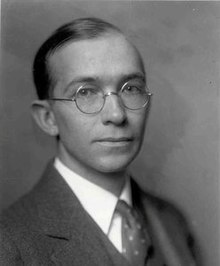Newton Arvin
| Newton Arvin | |
|---|---|
 |
|
| Born | Frederick Newton Arvin August 25, 1900 Valparaiso, Indiana, U.S. |
| Died | March 23, 1963 (aged 62) Northampton, Massachusetts, U.S. |
| Resting place | Union Street/Old City Cemetery, Porter County, Indiana |
| Occupation | Teacher, writer |
| Language | English |
| Nationality | American |
| Alma mater | Harvard University |
| Notable works |
Hawthorne Whitman Herman Melville Longfellow: His Life and Work |
| Notable awards | National Book Award, 1951 |
Fredrick Newton Arvin (August 25, 1900 – March 21, 1963) was an American literary critic and academic. He achieved national recognition for his studies of individual nineteenth-century American authors.
After teaching at Smith College in Northampton, Massachusetts for 38 years, he was forced into retirement in 1960 after pleading guilty to charges stemming from the possession of pictures of semi-nude males that the law deemed pornographic.
Arvin was also one of the first lovers of the author Truman Capote.
Frederick Newton Arvin was born in Valparaiso, Indiana, and never used his given first name. He studied English Literature at Harvard, graduating summa cum laude in 1921. His writing career began when Van Wyck Brooks, the Harvard teacher he most admired, invited him to write for The Freeman while he was still an undergraduate. After a short period teaching at the high school level, Arvin joined the English faculty at Smith College and, though he never earned a doctorate, won a tenured position. One of his students was Sylvia Plath, the poet and novelist.
He taught at Smith College for 38 years and was Mary Augusta Jordan Professor of English during the year before his retirement in 1961. He rarely left Northampton for long nor travelled far. He visited Europe only once in the summer of 1929 or 1930. He spent a year's leave of absence in the mid-1920s as the editor of Living Age, a weekly compendium of articles from British and American periodicals.
Arvin often wrote about political issues and took public political positions. For example, in 1936, on the day when Harvard celebrated its 300th anniversary, he joined a group of 28 Harvard graduates in an attack on retired Harvard president Abbott Lawrence Lowell for his role years earlier on an advisory Committee to Massachusetts Governor Alvan T. Fuller that found that Sacco and Vanzetti had received a fair trial. Among his co-signors were editor Malcolm Cowley and author John Dos Passos.
...
Wikipedia
